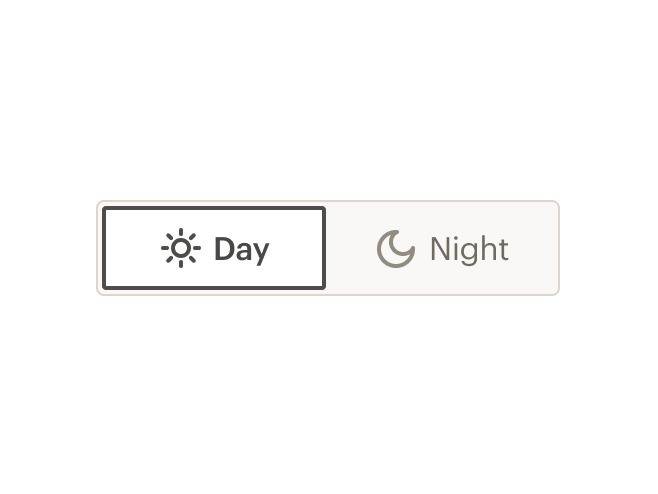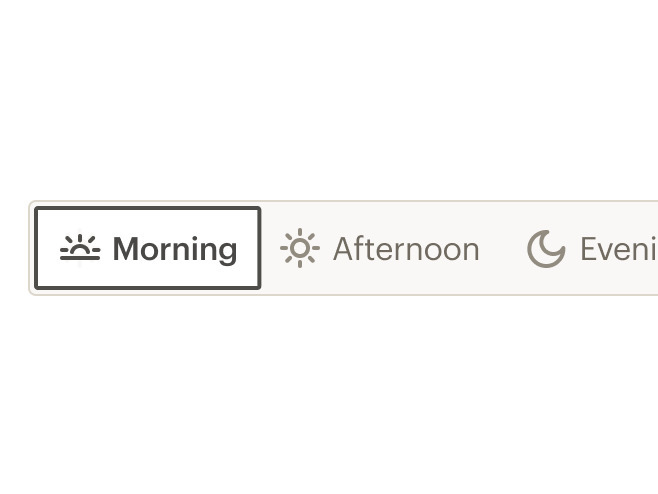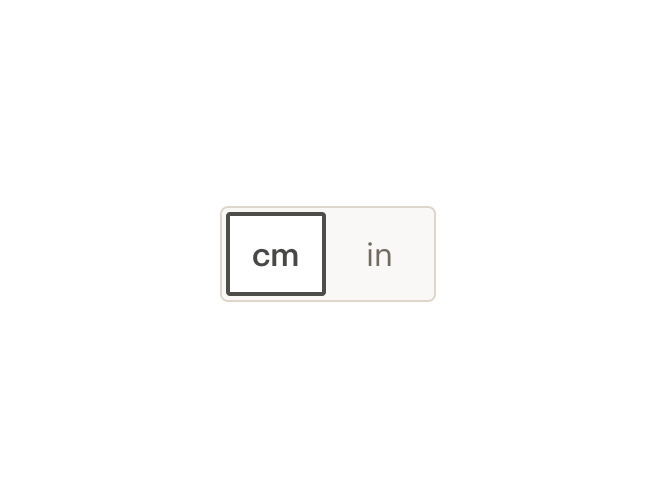toggle button
Permits switching two or more options on and off
Toggle buttons are a set of two or more options, each of which functions as a button. Use them to switch between alternative views of similar or related content in a contextual setting. For instance, the component allows users to toggle between a grid or list view, or to toggle between centimeters or inches.
When to use
- Providing choices that affect an object, state, or view
- Displaying two or more mutually exclusive options
- Changing contextual information
- The change needs to take immediate effect
When not to use
- Displaying related content that isn’t the same type, which should be separated completely. Instead, use tabs
- Allowing the user to take an action, such as add and remove. Instead, use a button
- Content can’t fit on the smallest breakpoint (too many options can be hard to scan and navigate). Aim for five options at most. Instead, use radio buttons or select
Choosing the right component
Switches, checkboxes, radio buttons and toggle buttons are all similar types of selection controls, but are generally not interchangeable. If you're not sure which one to use for a certain scenario, use this comparison table.
| Criteria | Radio button | Checkbox | Single checkbox | Switch | Toggle button |
|---|---|---|---|---|---|
| Selections available | At least two | At least one | Just one | Only two (on or off) | At least two (this or that) |
| Default option | Yes | No | Yes | Yes | Yes |
| Choices | Mutually exclusive | Independent of each other | Mutually exclusive | Mutually exclusive | Mutually exclusive |
| Takes effect | After a user clicks a submit button | After a user clicks a submit button | After a user clicks a submit button | Immediately | Immediately |
The toggle button contains at least two selections, with a default option selected. You can also extend the component to include more than two. Take care in using toggle buttons that include more than five selections, as space on mobile is limited. Consider checking whether the toggle button will work on Cedar’s XS breakpoint.

Do limit the number of segments to aid in usability and scanning.

Don't include more segments than what fit on the smallest breakpoint.
- Use nouns or noun phrases for labels
- As much as possible, use content with a similar character count in each segment
Use text-only labels when:
- Text/copy adequately informs the user of the expected content
- There is no CdrIcon to properly inform the user of represented content

Do use content types that make sense for each experience.

Don't mix content types in the same toggle button.
What Cedar provides
- Sets the role of the unordered list to
radiogroup - Sets the role of the individual toggle buttons to
radio - Provides an
aria-checkedproperty for each toggle button
Development responsibilities
When using this component, here's what you are responsible for:
Always provide a toggleValue prop. The value of this property will be used as an aria-label attribute. This has the following uses:
- Spelling out abbreviated values (like "centimeters" instead of "cm") for screen readers
- Providing a label when only an icon is slotted to the toggle button
The parent CdrToggleGroup contains all the child CdrToggleButton components. This component will track the value of the selected toggle button among all the toggle buttons slotted to it. CdrToggleGroup requires v-model to track the value of the selected child CdrToggleButton.
<template>
<cdr-toggle-group v-model="units">
<cdr-toggle-button toggleValue="centimeters">cm</cdr-toggle-button>
<cdr-toggle-button toggleValue="inches">in</cdr-toggle-button>
</cdr-toggle-group>
</template>
The toggleValue prop of the selected CdrToggleButton will determine the modelValue of the selected toggle button. If no text or icon is slotted to the toggle button, the string provided for the required toggleValue prop displays as the button text. In cases where the slotted text and the toggleValue are different, as shown in the previous example, the slotted text gets displayed in the browser.
The modelValue of the CdrToggleGroup is always determined by the toggleValue prop of the selected CdrToggleButton. Also, screen readers will choose to read the toggleValue over the slotted text, which is handy in the case of abbreviations.
CdrToggleButton
Props
| Name | Type | Default |
|---|---|---|
toggleValue Required Sets the value and aria-label for the toggle button. Display can be overridden using default slot | string |
Slots
| Name |
|---|
default CdrToggleButton label content |
CdrToggleGroup
Props
| Name | Type | Default |
|---|---|---|
modelValue Required
| string|number|boolean|object|array | |
size Sets toggle button size Possible values: medium, large | string | 'medium' |
Slots
| Name |
|---|
default CdrToggleGroup content (CdrToggleButton components) |
Events
| Name | Parameters |
|---|---|
update:modelValue Event emitted by v-model | modelValue |